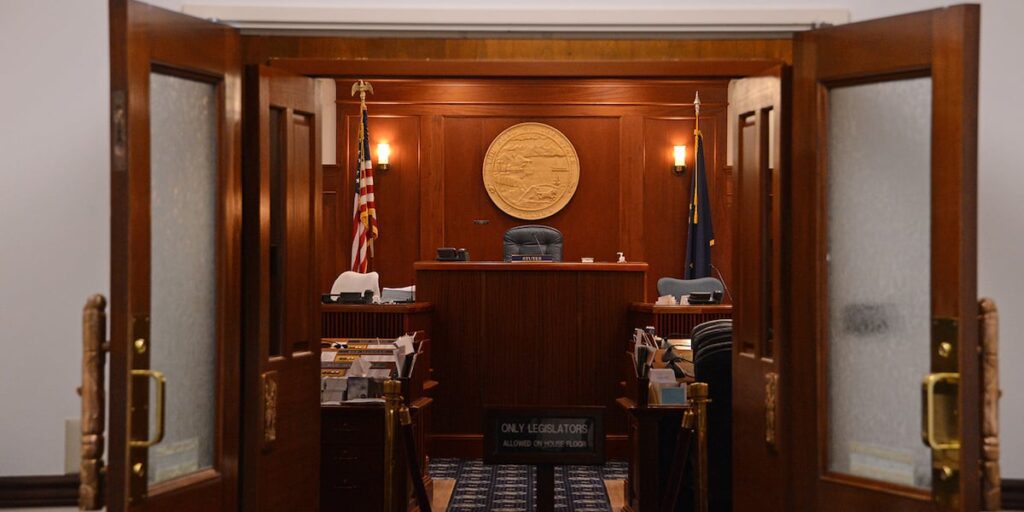ANCHORAGE, Alaska (KTUU) – In outlining their Alaska legislative priorities, the House’s new bipartisan leadership appears likely to separate themselves from last session’s conservative-leaning majority, who stood with Gov. Mike Dunleavy as he vetoed a compressive education package.
“We have heard loud and clear from Alaskans that we need stable education funding for great schools with small class sizes,” said incoming Speaker Bryce Edgmon, I-Dillingham.
The caucus consists of 21 members, the minimum needed to establish a majority in the 40-member House. It comprises of 14 Democrats, five independents, and two Republicans.
The 19 members who do not belong to the majority are all Republicans.
Edgmon was a member of last session’s mostly Republican and conservative-leaning House Majority, with fellow Bush Caucus members Rep. Thomas Baker, Rep. Neal Foster, R-Nome, and CJ McCormick, D-Bethel.
When it came to education legislation last session, with the exception of a few members, the majority voted to sustain Dunleavy’s veto on a comprehensive education bill, SB 140.
The bill would have provided permanent funding for education with a $680 increase to per-student funding, known as the Base Student Allocation. Additionally, it would allocate funds for school transportation, rural internet, correspondence schools, and addressing reading deficiencies.
Calling the legislation a “spending bill” before vetoing it, the governor said the bill did nothing to improve education, specifically charter school reform and teacher retention.
Before vetoing the bill, the governor expressed frustration language, for both were absent in the bill that passed both the House and Senate.
Edgmon and Foster joined the mostly Democratic House Minority in voting to override the governor’s veto, which failed by one vote.
All are now teaming up to be part of the bipartisan House Majority Coalition, which features two Republicans, including former Rep. Chuck Kopp, who returns to Juneau after defeating House Rules chair, Rep. Craig Johnson, R-Anchorage. Johnson voted to support the governor’s veto.
Kopp said, “Alaska voters have clearly expressed their will” regarding issues such as education.
Bush Caucus member McCormick voted to override the governor’s veto but was beaten by fellow Democrat, Nellie Jimmie, in the general election.
However, fellow Bush Caucus member Baker voted to sustain the governor’s but was also beaten in the General Election by Democrat Robyn Burke, who for the last two years served as North Slope Borough School District Board president.
Both Burke and Jimmie will be joining the Majority Coalition.
Rep. Julie Coulombe, R-Anchorage, who was also part of last session’s majority and voted to sustain the governor’s veto, said it is clear that each district had its “tipping point” regarding this year’s election.
“I think for me, the message is they’re upset with the legislature, and we got to do things different – whether that’s, you know, education or energy, whatever the issue is. There were certain priorities in certain districts that maybe the voters were upset about. I definitely, you know, education is obviously an issue for Anchorage,” Coulombe said. “It’s hard for me to make a blanket statement that all the races won or lost on an issue because certainly I was a target on the education issue, but I explained what happened and why I voted – the way I did and did the best I could to say I’m for education.”
Coulombe was able to win her race over nonpartisan candidate Walter Featherly.
Even though she supports education, Coulombe said she is not interested in joining the newly created Majority Coalition.
“It’s a Democrat caucus with a couple of ours, and so I have a real struggle with their priorities and values,” Coulombe said. “The minority Democrat caucus constantly want to spend money with no accountability where that money is coming from. That’s my biggest thing, because my priority was the budget last two years, and so fiscal responsibility is top of my list.”
Rep. Andi Story, D-Juneau, and Rep. Rebecca Himschoot, NA-Sitka, will serve as the education chairs for the incoming House Majority Coalition.
Both voted to override the governor’s veto last session and will replace education chairs Jamie Allard of Eagle River and Justin Ruffridge of Soldotna.
However, Ruffridge did vote to override the governor’s veto.
Story and Himschoot were on the education committee last session and, at times, did not agree with Allard on some education issues, such as the size of the BSA and charter schools.
The coalition has also outlined energy, retirement reform, and balanced budgets as priorities for the upcoming session.
Other committee assignments:
Resource Committee Co-Chairs: Maxine Dibert and Robyn Burke.
Energy Co-Chairs: Donna Mears and Ky Holland.
House Finance Committee: Co-Chairs Neal Foster (bills), Andy Josephson (operating budget), and Calvin Schrage (capital budget), with members Sara Hannan, Alyse Galvin, and Nellie Jimmie.
Majority Leader: Chuck Kopp
Majority Whip: Zack Fields.
State Affairs: Ashley Carrick
Health and Social Services: Genevieve Mina
Labor and Commerce: Zack Fields and Carolyn Hall
Committee and Regional Affairs: Donna Mears and Rebecca Himshoot
Judiciary: Andrew Gray
Transportation: Ted Eischeid and Ashley Carrick
Military and Veteran Affairs: Ted Eischeid
Joint Armed Services Committee: Andrew Gray
Fisheries: Louise Stutes
Tribal Affairs: Bryce Edgmon and Maxine Dibert
See a spelling or grammar error? Report it to web@ktuu.com
Copyright 2024 KTUU. All rights reserved.

